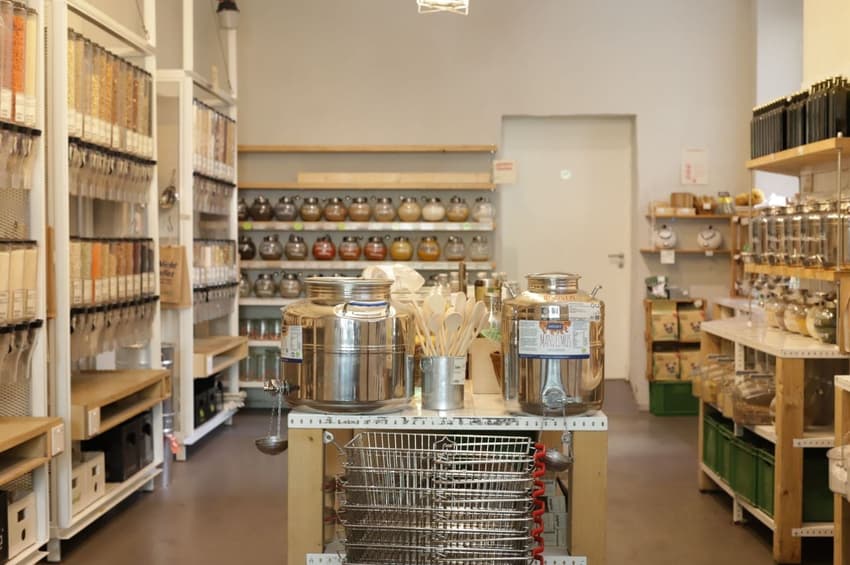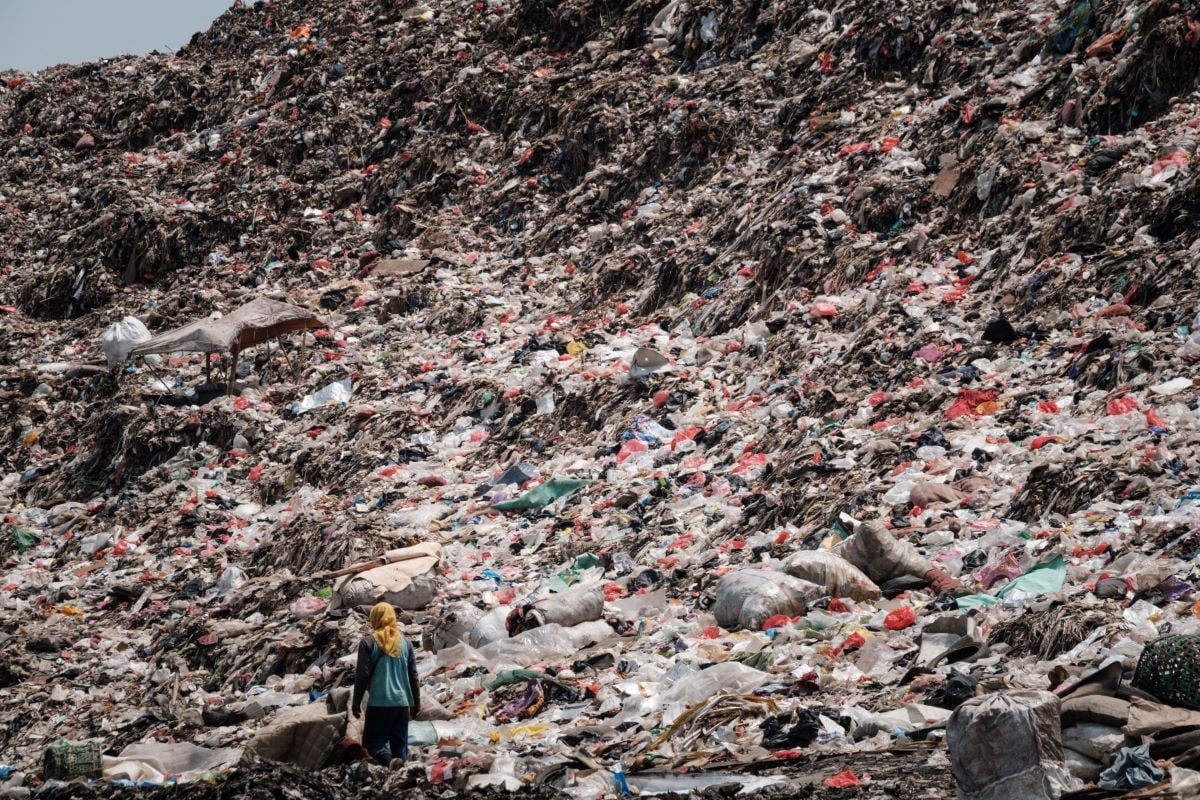EXPLAINED: Why and how to start a zero-waste lifestyle in Germany

With zero-waste markets found in the majority of cities across the country, Germany is a good place to try embracing a reduced-waste or plastic-free lifestyle. We take a look at Germany's waste reduction efforts, and where you can shop to reduce the amount of trash you bring home.
Germany has earned a reputation for being a world leader in recycling – with a recycling rate of about 65 percent, it leads the world in preventing waste from going straight to the landfill.
That said, the average German still produces a lot of waste each year, significantly more than the average EU resident. According to Germany’s Statistics Office (Destatis), the municipal waste per inhabitant in Germany amounted to a total of 620 kilograms in 2021. The EU average per inhabitant during that year was 527 kilograms.
Why reduce waste?
Reducing waste has an impact on land use by cutting down the amount of material that needs to be sent to landfills. It also saves energy resources, because whether waste is recycled, incinerated or sent to a landfill, all of that takes energy.
READ ALSO: The complete guide to recycling in Germany
Limiting your consumption of certain types of waste can also be a benefit to your health. For example, cutting down the amount of plastic-wrapped food and drinks you consume may reduce your exposure to certain toxins.
Research sponsored by the World Wildlife Fund, and conducted at The University of Newcastle, found that on average people are ingesting 5 grams of plastic each week – the equivalent of eating a credit card.
The study also suggested that the largest source of plastic ingestion is through water. Another recent study, found that microplastic particles in bottled drinking water were 10 to 100 times more than previously estimated.
Plastics, and many of the chemical additives within them, are known to be toxic. The direct health impacts of ingesting plastics are still not well understood, but researchers tend to agree that plastic exposure isn’t advisable.
If you’d like to limit your own exposure, reducing the amount of food and drinks you consume that are packaged in plastic is probably the best way to start.

A scavenger trudges through a mountain of plastic waste in a landfill in Jakarta, Indonesia. Some of the Germany's plastic waste that cannot be recycled is exported to landfills in foreign countries such as this one. Photo by Yasuyoshi CHIBA / AFP
Where you can shop to reduce waste
Buying foods in bulk, and carrying them home your own reusable containers, is a great way to start reducing waste.
Some grocery stores in Germany, especially organic stores, offer some grains, flours and other dried items in bulk bins. There are also specialty stores, like Vom Fass, that offer oils, vinegar, liquors and other liquids on tap.
But for a more comprehensive waste-free grocery selection, seek out your local zero-waste (unverpackt) store.
This map on the Wasteland Rebel blog shows zero-waste markets and shops across Germany, and you can also scroll down for maps in a few other surrounding countries.
Germany’s ‘zero-waste’ leader in the North
Kiel is the first German city to be called a “zero-waste” city by Zero Waste Europe.
To be clear, the designation doesn’t mean that the capital of Schleswig-Holstein has entirely eliminated waste from the city. But it’s adopted a comprehensive plan to reduce waste at a municipal level.
READ ALSO: German Edeka store legitimises 'dumpster-diving' to reduce food waste
Among the plan’s major components are a ban on single-use items at public institutions, installing more drinking fountains across the city, teaching children about waste in school, and trialling a “pay as you throw” program where people are charged only for what is thrown in their mixed waste bin.
The city’s zero-waste focus seems to have inspired individuals to launch interesting projects of their own to help reduce waste and clean things up. As reported by NDR, a former hairdresser launched a project to collect hair from salons to be used to filter oily pollution from the city’s waterways.
Individual actions add up to systemic change
Germany still has a long way to go in terms of reducing waste overall, but there are lessons to be learned from the country’s waste management efforts.
One such lesson is that positive individual actions – such as Germans’ seriousness about properly sorting and recycling waste – really adds up across a large population.
READ ALSO: Five ways Germany makes you greener (without even noticing)
With that in mind, any additional changes you can make on a personal level are certainly worth doing. Along with buying in bulk as much as possible, carrying a reusable water bottle instead of buying plastic ones and using mesh bags for produce are both good habits for reducing waste.
Additionally, its worth making an effort to upcycle, gift, or sell items like clothes that are still have some life left. When it comes to clothing in particular, Germany has a 'throwaway culture.' Rather than throwing clothes out, you may want to try selling them on a second-hand exchange platform like Vinted or Kleinanzeigen. Reselling, or gifting clothes directly, tends to be a more sustainable choice than dropping them in donation bins because many 'donated' clothes ultimately end up in landfills.
Find more apps related to sustainable living in Germany at Recyclist Magazine.
Find more tips and tricks for zero-waste living in the Wasteland Rebel blog.
Comments
See Also
Germany has earned a reputation for being a world leader in recycling – with a recycling rate of about 65 percent, it leads the world in preventing waste from going straight to the landfill.
That said, the average German still produces a lot of waste each year, significantly more than the average EU resident. According to Germany’s Statistics Office (Destatis), the municipal waste per inhabitant in Germany amounted to a total of 620 kilograms in 2021. The EU average per inhabitant during that year was 527 kilograms.
Why reduce waste?
Reducing waste has an impact on land use by cutting down the amount of material that needs to be sent to landfills. It also saves energy resources, because whether waste is recycled, incinerated or sent to a landfill, all of that takes energy.
READ ALSO: The complete guide to recycling in Germany
Limiting your consumption of certain types of waste can also be a benefit to your health. For example, cutting down the amount of plastic-wrapped food and drinks you consume may reduce your exposure to certain toxins.
Research sponsored by the World Wildlife Fund, and conducted at The University of Newcastle, found that on average people are ingesting 5 grams of plastic each week – the equivalent of eating a credit card.
The study also suggested that the largest source of plastic ingestion is through water. Another recent study, found that microplastic particles in bottled drinking water were 10 to 100 times more than previously estimated.
Plastics, and many of the chemical additives within them, are known to be toxic. The direct health impacts of ingesting plastics are still not well understood, but researchers tend to agree that plastic exposure isn’t advisable.
If you’d like to limit your own exposure, reducing the amount of food and drinks you consume that are packaged in plastic is probably the best way to start.

Where you can shop to reduce waste
Buying foods in bulk, and carrying them home your own reusable containers, is a great way to start reducing waste.
Some grocery stores in Germany, especially organic stores, offer some grains, flours and other dried items in bulk bins. There are also specialty stores, like Vom Fass, that offer oils, vinegar, liquors and other liquids on tap.
But for a more comprehensive waste-free grocery selection, seek out your local zero-waste (unverpackt) store.
This map on the Wasteland Rebel blog shows zero-waste markets and shops across Germany, and you can also scroll down for maps in a few other surrounding countries.
Germany’s ‘zero-waste’ leader in the North
Kiel is the first German city to be called a “zero-waste” city by Zero Waste Europe.
To be clear, the designation doesn’t mean that the capital of Schleswig-Holstein has entirely eliminated waste from the city. But it’s adopted a comprehensive plan to reduce waste at a municipal level.
READ ALSO: German Edeka store legitimises 'dumpster-diving' to reduce food waste
Among the plan’s major components are a ban on single-use items at public institutions, installing more drinking fountains across the city, teaching children about waste in school, and trialling a “pay as you throw” program where people are charged only for what is thrown in their mixed waste bin.
The city’s zero-waste focus seems to have inspired individuals to launch interesting projects of their own to help reduce waste and clean things up. As reported by NDR, a former hairdresser launched a project to collect hair from salons to be used to filter oily pollution from the city’s waterways.
Individual actions add up to systemic change
Germany still has a long way to go in terms of reducing waste overall, but there are lessons to be learned from the country’s waste management efforts.
One such lesson is that positive individual actions – such as Germans’ seriousness about properly sorting and recycling waste – really adds up across a large population.
READ ALSO: Five ways Germany makes you greener (without even noticing)
With that in mind, any additional changes you can make on a personal level are certainly worth doing. Along with buying in bulk as much as possible, carrying a reusable water bottle instead of buying plastic ones and using mesh bags for produce are both good habits for reducing waste.
Additionally, its worth making an effort to upcycle, gift, or sell items like clothes that are still have some life left. When it comes to clothing in particular, Germany has a 'throwaway culture.' Rather than throwing clothes out, you may want to try selling them on a second-hand exchange platform like Vinted or Kleinanzeigen. Reselling, or gifting clothes directly, tends to be a more sustainable choice than dropping them in donation bins because many 'donated' clothes ultimately end up in landfills.
Find more apps related to sustainable living in Germany at Recyclist Magazine.
Find more tips and tricks for zero-waste living in the Wasteland Rebel blog.
Join the conversation in our comments section below. Share your own views and experience and if you have a question or suggestion for our journalists then email us at [email protected].
Please keep comments civil, constructive and on topic – and make sure to read our terms of use before getting involved.
Please log in here to leave a comment.